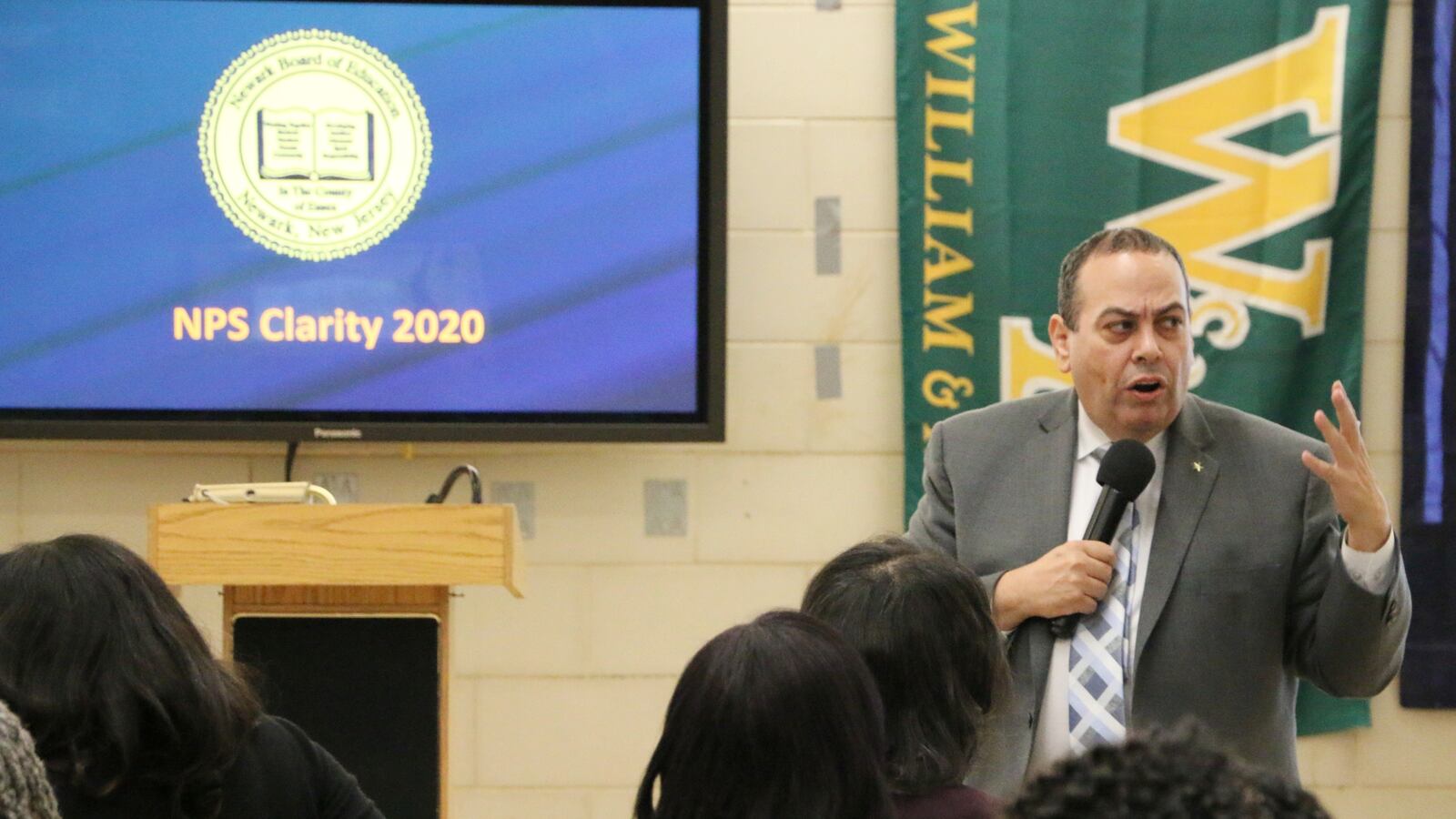After nearly one year on the job, Newark’s superintendent unveiled a long-awaited district plan Thursday that hints at new initiatives while leaving most of the details to be filled in later.
The plan, which Superintendent Roger León crafted with the help of a consulting firm, sets forth a broad theory of change for New Jersey’s largest school district. It is designed to guide the district back to full local governance and set the stage for a more-detailed 10-year plan.
The theory posits that the school system must simultaneously address students’ academic and personal needs, which can only happen through increased cooperation among schools and closer partnership with the community and outside organizations. And it says the district must begin supporting future students while they are still in the womb and continue until they finish college or start careers.
The one-year plan offers a rough sketch of how the district will put that theory into action. Mainly, it lays out a long to-do list focused on analyzing current practices and data and developing new programs and policies.
“This strategic plan is designed to set the foundation for everyone and set the ball rolling,” León wrote in an introduction to the plan, titled NPS Clarity 2020. “We will rebuild a stronger, wiser, and more efficient organization.”
The plan does not include goals for student achievement or timelines for the rollout of new initiatives — both of which are featured in the district’s current three-year plan, which expires this month.
León has previously faced calls from board members to share clear goals for the district. And a document governing the district’s release from state control says the superintendent’s plan should be used to hold the district accountable “for achieving measurable goals that will drive student success.” (A district spokesperson did not respond to a request for comment.)
León’s plan references several specific efforts without going into detail. They include hiring more black and Latino male teachers, training current employees to respect students’ cultures and screening new hires for biases, embedding staffers in every school to coordinate support services for students, sending principals to other schools to get ideas and give feedback, and connecting every student with a mentor and internship opportunities.
But many of the strategies mapped out in the plan are broader and call for redesigning every aspect of the school system — from teacher training and evaluation to student transportation, special education, and the district’s management structure. Léon has promised to release a longer-term roadmap for the district a year from now.
“From work defined in NPS Clarity 2020, we will build and launch a ten-year strategic plan that will reform education in Newark beyond the next decade and for generations to come,” he wrote.
León’s blueprint arrives at a pivotal moment for Newark. Last year, the state began the process of ending its decades-long takeover of the district and the newly empowered city school board chose León — a veteran Newark educator — as superintendent. If the district meets the state’s requirements during the current probationary period, the elected board will gain final control over the schools next February.
León, who started in his new role last July, appears to be guiding the district in that direction. A state report, which was completed in March but made public Thursday, found that the district is so far meeting all of the requirements to transition back to full local control. And during a state school board meeting last week, several board members said they were impressed by León’s leadership and the preview he gave of his plan.
“We have a leader who is as good as any superintendent who has ever come before us,” said state board president Arcelio Aponte, adding that he has known León since they were children. “Superintendent León is well-positioned to lead this district forward.”
León’s tenure follows a recent period of upheaval in Newark that began in 2011 under state-appointed superintendent Cami Anderson, who was brought in from New York to overhaul the district. With support from U.S. Sen. Cory Booker and national philanthropists including Facebook founder Mark Zuckerberg, Anderson closed some schools, revamped the enrollment system, and laid off many district employees. Some of the policies were driven by the explosive growth of the city’s charter schools, which now educate a third of Newark students.
León’s plan takes stock of some of those changes. It says the state’s operation of the district showed that “the absence of knowledgeable and skilled voices” from the local schools and community made it difficult to “solve complex problems.” And it asserts that “unchecked competition” between traditional and charter schools “destabilizes the infrastructure and resources of the District while promoting division and discord in our communities.”
Yet the plan also calls for collaboration between the district and charter and private schools. And León said Thursday his plan is not an indictment of previous change efforts.
“It is not a critique of reform practices — the most aggressive that we’ve had over the last seven years,” León said at a launch event for his plan.

The policies of the past decade sparked bitter protests, while the charter expansion strained the district’s budget. Yet student achievement also greatly improved during that period, as highlighted by a new report published Thursday. The district’s test scores and graduation rate have climbed steadily in recent years, and its enrollment has stabilized after years of contraction while the charter sector expanded.
But challenges remain. More than 11,500 students are enrolled in chronically low-performing district schools, according to the report produced by MarGrady Research and funded by the New Jersey Children’s Foundation. District officials have warned of budget shortfalls if the charter sector reaches the full size approved by the state. And the district is still grappling with legal settlements and federal investigations that began under previous administrations, León has said.
“We applaud Superintendent Leon and his team for unveiling a strategic plan to continue the improvement of the Newark public school system,” said Kyle Rosenkrans, executive director of the New Jersey Children’s Foundation, in a statement. He added that “much work remains until we can guarantee every child in the city access to a great public school.”
León’s plan draws on substantial input from local stakeholders — including 2,000 personal conversations he said he had last year and a series of focus groups and forums this spring with educators, students, parents, and community partners.
The planning process was led by a Newark-based consultancy called Creed Strategies that is headed by Lauren Wells. Wells, a former teacher with a doctorate in urban schooling, previously advised Mayor Ras Baraka and helped spearhead an effort to improve several Central Ward schools and infuse them with extra services for students and their families.
After León presented his plan Thursday at Science Park High School, he hosted a celebratory dinner at the school complete with a cake that said “NPS Clarity 2020” in red icing. One of the attendees, Rev. Louise Scott-Rountree, said it is now up to the community to help bring the plan to life.
“We all have to play our part,” said Scott-Rountree, who directs clergy relations for the mayor’s office. “The superintendent can’t do it alone.”

